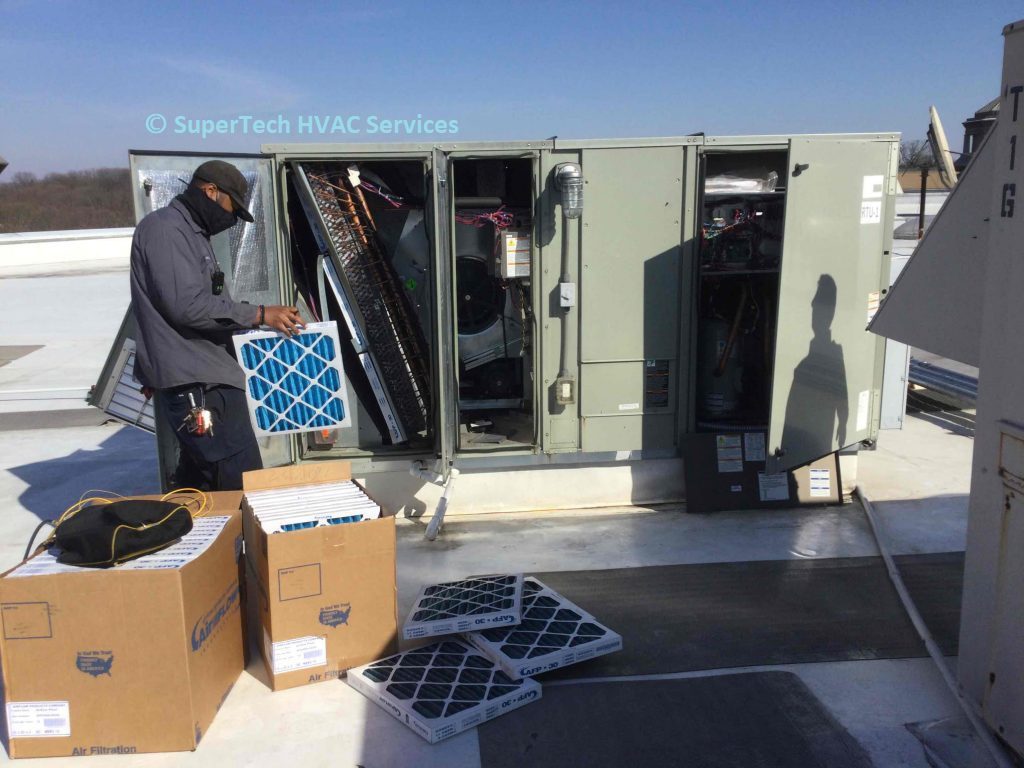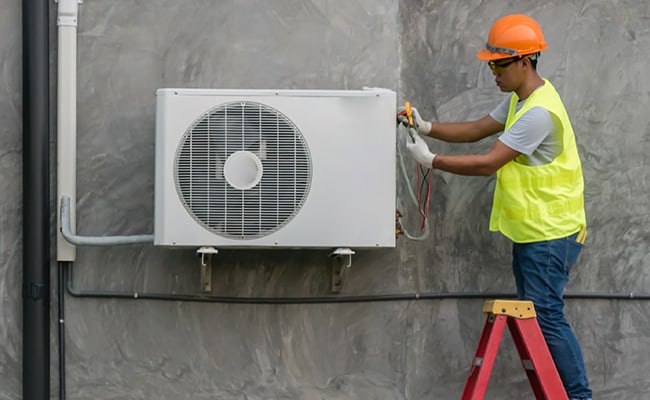Selecting Between a Heatpump and Heating System: Secret Factors To Consider for Your HVAC Demands
When reviewing heating options for a/c needs, the decision between a warmth pump and a heater can be complex. Each system uses distinctive advantages tailored to details environments and power performance objectives. Recognizing these differences is essential for making an educated option. Trick aspects such as installation expenses and environmental influence further make complex the choice procedure. Which choice truly aligns with one's convenience and sustainability preferences? The complying with areas will check out these considerations in detail.
Comprehending Heat Pumps: Exactly How They Work and Their Advantages
While lots of house owners think about numerous home heating alternatives, comprehending how heat pumps feature and their benefits can considerably affect their choice. Heatpump operate by moving warmth instead of generating it. In the wintertime, they draw out heat from the outside air or ground and move it inside your home, while in the summer, they reverse this process, cooling down the home by getting rid of warmth outside. This dual functionality makes them flexible for year-round climate control.One of the main benefits of heatpump is their energy effectiveness. They utilize considerably less power contrasted to traditional heating systems, possibly causing reduced energy expenses (furnace replacement). In addition, warmth pumps have a smaller carbon impact, making them an eco-friendly option. They also need less maintenance than conventional systems, adding to long-term cost savings. In general, comprehending the auto mechanics and advantages of heat pumps can help property owners make notified decisions concerning their heating and cooling down needs
Exploring Heaters: Types, Operation, and Advantages
Furnaces come in numerous kinds, consisting of gas, electric, and oil versions, each with distinctive operational mechanisms. Understanding these differences is essential, as they impact efficiency and home heating performance. Additionally, furnaces use many benefits, such as consistent heat outcome and reliability in chillier climates.
Kinds of Heating systems
Heater can vary significantly in design and procedure, with heating systems being a preferred option among homeowners. There are numerous sorts of furnaces, each making use of various gas resources and innovations. Gas heaters are usual, leveraging natural gas to produce warm efficiently. Electric heating systems, on the other hand, make use of electric resistance to create warmth, usually favored for their uncomplicated installment. Oil heaters, while less usual, work in areas with minimal gas gain access to (heat pump service). In addition, condensing heating systems maximize power performance by recording and recycling exhaust gases. Each type runs through a system of warm exchangers and ductwork to disperse warm air throughout a home. Recognizing the distinctions between these heating system kinds is important for notified cooling and heating decisions
Benefits of Furnaces
For property owners looking for dependable heat throughout cold months, the advantages of heating systems are substantial. Heating systems give consistent heating, making certain even temperatures throughout the home. They are especially reliable in severe chilly, frequently outmatching heatpump in frigid problems. Numerous types, consisting of gas, electrical, and oil heaters, offer versatility to satisfy varied needs and preferences.Furnaces also have a tendency to have reduced first setup expenses contrasted to heatpump, making them a much more obtainable alternative for several. Their durable style adds to a much longer life-span, with several devices lasting over 15 years with correct upkeep. In addition, contemporary heaters are typically outfitted with advanced technology for improved performance, which can bring about lowered power expenses. In general, heating systems stay a trustworthy choice for effective home heating.

Power Efficiency: Contrasting Heat Pumps and Furnaces
When comparing power performance between heatpump and furnaces, the Seasonal Power Performance Ratio (SEER) plays a crucial function in establishing performance. Furthermore, a functional price evaluation exposes the long-term financial effects of each system. Comprehending these elements can direct property owners in making educated choices regarding their heating solutions.
Seasonal Power Effectiveness Proportion
Power performance plays a vital function in the decision-making process in between heatpump and heating systems, particularly when taking into consideration the Seasonal Power Effectiveness Ratio (SEER) This statistics steps the cooling effectiveness of warm pumps over a whole air conditioning period, supplying a standard means to evaluate performance. Greater SEER ratings indicate greater power performance, converting to reduced energy intake and reduced energy costs. In comparison, heaters are generally evaluated utilizing the Annual Fuel Application Effectiveness (AFUE) score, which reflects heating efficiency. When contrasting these 2 systems, house owners need to prioritize SEER rankings for heatpump, as they straight impact total power cost savings and environmental sustainability. An extensive understanding of SEER can notably influence the lasting contentment and cost-effectiveness of the selected a/c service.
Functional Expense Analysis
Recognizing the functional costs related to heatpump and furnaces is essential for home owners reviewing their choices. Heatpump usually offer greater energy efficiency, transforming electrical power into warmth with marginal waste. This causes lower month-to-month utility costs, specifically in moderate environments. Conversely, typical heating systems, particularly gas models, may have lower upfront costs but can incur higher functional costs over time because of sustain prices and efficiency ratings.Moreover, warmth pumps can function as both heating and cooling down systems, possibly decreasing the requirement for different HVAC units. While first financial investments for warmth pumps might be higher, their long-term cost savings in power performance can make them an extra economical selection for many homes. Careful evaluation of local power rates is crucial to identify the best choice.
Installation Costs: What to Expect for each and every Furnace
Setup expenses for furnace can differ considerably between heatpump and furnaces, influencing house owners' choices. Warm pumps usually have greater in advance installment expenses, typically varying from $3,500 to $8,000, depending upon the system dimension and intricacy of installation. This includes the outside unit, interior handling system, and needed ductwork alterations. Conversely, heating systems often tend to have reduced preliminary prices, averaging between $2,500 and $6,000, which can be appealing for budget-conscious homeowners. Nonetheless, installment expenses can raise if comprehensive ductwork is required.Moreover, the option of fuel kind for furnaces-- gas, propane, or electrical-- can additionally impact setup costs. While heat pumps supply power effectiveness, their first financial investment might deter some customers. Eventually, examining setup prices together with long-term savings and effectiveness will assist property owners in making educated decisions concerning their heating unit.
Climate Considerations: Which System Executes Much Better in Your Area
Exactly how do climate conditions affect the effectiveness of home heating systems? The performance of heatpump and heating systems can vary substantially depending on the neighborhood climate. the original source In moderate climates, heatpump stand out by efficiently moving warmth from the outside air, making them an energy-saving option. Their effectiveness lessens in incredibly chilly temperatures, where they might struggle to draw out sufficient heat. Conversely, heating systems, specifically gas versions, provide constant and trusted warm no matter of exterior conditions, making them more suitable in chillier regions.In areas that experience milder winters months, heatpump can run effectively year-round, giving both cooling and heating. On the other hand, regions with rough winters usually take advantage of the robustness of heating systems. Eventually, recognizing the local climate is important when making a decision in between a heatpump and a heating system, as it straight affects their operational efficiency and general efficiency.
Upkeep Needs: Long-Term Take Care Of Warmth Pumps vs. Furnaces
While both warm pumps and furnaces call for routine maintenance to assure peak performance, their details demands and care regimens differ considerably. Furnaces commonly require much less constant interest, with yearly assessments being enough to look for gas leakages, clean filters, and examine general capability. Their easier layout frequently enables straightforward repairs.In comparison, warm pumps necessitate semiannual maintenance due to their double role in heating & cooling. This includes cleaning coils, checking cooling agent levels, and making certain that both go to these guys the interior and exterior systems operate at their ideal. Furthermore, heatpump maintenance usually involves even more complex elements, making professional servicing essential.Neglecting upkeep can lead to reduced efficiency and boosted power costs for both systems. Inevitably, property owners need to consider these long-lasting care demands when selecting between a warmth pump and a heater, as proactive maintenance can expand the life expectancy and performance of either system significantly.
Environmental Influence: Picking a Sustainable Heating Choice
The ecological influence of heater is a vital evaluation for property owners looking for lasting alternatives. Heatpump are usually a lot more energy-efficient than traditional heating systems, as they transfer heat instead than produce it, greatly reducing carbon exhausts. By utilizing renewable resource resources, such as air-source or geothermal heatpump, house owners can additionally minimize their ecological footprint.On the other hand, all-natural gas furnaces send out greenhouse gases and add to air contamination, though they typically provide higher warmth outcome. Advancements in technology have led to the advancement of high-efficiency heaters that decrease emissions.Ultimately, choosing a home heating system involves considering effectiveness against environmental impact. House owners are encouraged to review neighborhood energy resources and motivations for sustainable systems, guaranteeing a selection that lines up with both individual comfort and environmental obligation. The decision influences not only immediate convenience however also long-lasting sustainability and ecological health and wellness.
Often Asked Inquiries
How Lengthy Do Warmth Pumps and Furnaces Generally Last?
The lifespan of warmth pumps generally varies from 15 to twenty years, while furnaces can last in between 15 to three decades. Regular upkeep significantly influences their longevity and effectiveness in offering home heating remedies.
Can I Utilize a Heatpump in Extremely Cold Climates?
Heatpump can operate in very cold environments, yet their efficiency lessens as temperatures decrease. In such problems, supplemental heating resources might be necessary to maintain comfy indoor temperature levels and guarantee peak performance.

What Is the Noise Level of Warm Pumps Versus Furnaces?
The noise degrees of warm pumps and heaters differ substantially. Usually, warm pumps run even more quietly than standard heating systems, making them preferable for those delicate to appear, while heaters might create louder operational noises during home heating cycles.
Are Warm Pumps Suitable for Both Cooling And Heating?
Heatpump are without a doubt suitable for both heating & cooling (heat pump replacement ooltewah tn). They work by moving warm, supplying effective temperature control year-round, making them a flexible choice for property owners seeking an all-in-one cooling and heating option
What Size Home Heating System Do I Required for My Home?
Figuring out the proper size heating unit for a home needs examining variables such as square video footage, insulation top quality, local environment, and the home's design. Consulting a professional can ensure an exact assessment and ideal comfort. Warmth pumps usually use higher energy effectiveness, transforming electrical power into warm with very little waste. In moderate climates, heat pumps succeed by successfully transferring warmth from the outside air, making them an energy-saving option. Conversely, heaters, especially gas models, supply reliable and regular warmth no matter of exterior problems, making them preferable in chillier regions.In areas that experience hop over to these guys milder wintertimes, warmth pumps can run efficiently year-round, supplying both heating and cooling. Warm pumps are usually much more energy-efficient than typical heaters, as they transfer warmth instead than create it, greatly minimizing carbon exhausts. By using sustainable power sources, such as geothermal or air-source warmth pumps, homeowners can further lessen their ecological footprint.On the other hand, natural gas furnaces emit greenhouse gases and add to air contamination, though they commonly offer greater heat result.